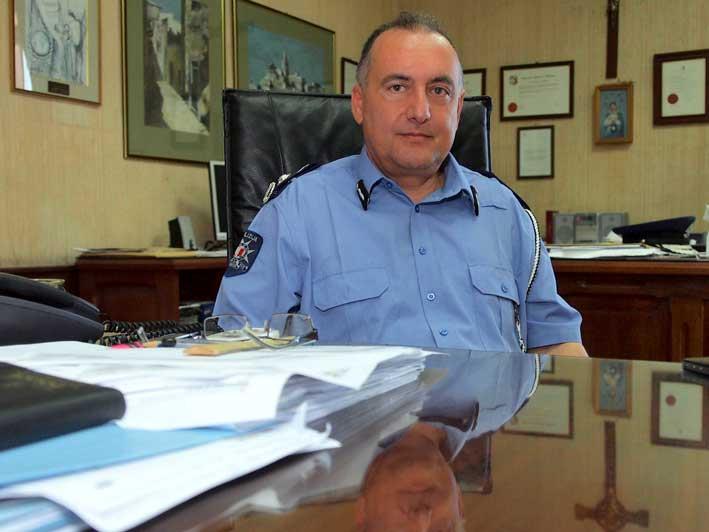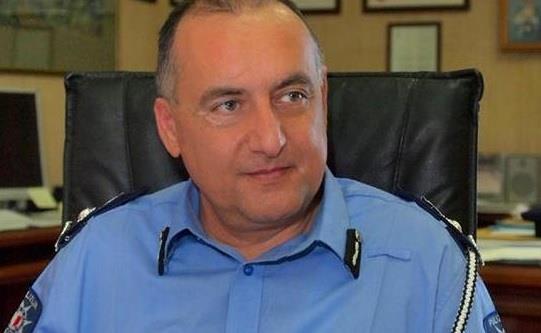Former Police Commissioner Peter Paul Zammit said that following a meeting with himself and the Prime Minister, he resigned because “It seemed like the Corps didn’t settle in on certain aspects”.
Asked by this newspaper whether his resignation came in the aftermath of his decision to drop charges pressed against a former legal client of his for assaulting four police officers at the Zabbar police station in 2013, Mr Zammit said: “It definitely wasn’t related to the case.”
“There was a meeting between the Prime Minister and myself. In the end it is the right of the Prime Minister to decide who the make Commissioner and who not to keep,” he said.
An inquiry into the former Commissioner’s decision to drop the charges against Josmar Agius, the man who had allegedly assaulted the four officers, found Mr Zammit acted on his own when he stopped police proceedings against the man.
In an interview with this newspaper, Mr Zammit spoke of the difference between halting proceedings, which he states is normal procedure in such circumstances… and halting an investigation. He was adamant that he never ordered the investigations to stop. Although he states that the district officers should have known that investigations were to continue, as per procedure, in hindsight he would have made this clearer.
“It is police practice that, where an allegation is made which disputes criminal charges, one does not allow court procedure to continue. The practice is called ‘staying of proceedings’. First you suspend proceedings and the withdrawal, if needed, would occur later. Suspending the proceedings was the first phase. We would then see how a case would develop and decide how to proceed,” he explained.
Mr Zammit explained that no investigation actually took place, and specifically asked if this was on his order, he said “no”.

Describe your relationship with your former client Mr Agius?
The word client refers to all those who consult a lawyer for advice. Advice given is not all the same, there is advice given on civil matters, criminal cases and even advice on subjects that affect family life. In this case, he was a client on issues relating to inheritance, a will and how these things are handled.
A phone call was made on the day of the incident, where Mr Agius called you. What was said during the call?
Word for word… it’s hard to remember as I receive a lot of phone calls, however the gist of the conversation saw him inform me that he had gone to the station to file a report regarding his minor daughter whom the police had refused to let file a report and refused her assistance. They sent her out of the police station. I asked him what happened and he told me he went to file a report regarding his minor daughter since they kicked her our rather than helping her, and when he entered into the presence of the police Sergeant, the same police Sergeant snapped at him and ordered him out of the police station. I asked him - ‘was anyone hurt, was there a fight?’ and he told me ‘no’. I then instructed him to fill in and file a complaint form. I only instructed him to do this.
The PIRS report read – “there was a commotion and a threat to report police officers”, yet the charge sheet read that he would be charged with assault. Given that he was your client, couldn’t you forsee the possible insinuation of bias by stopping proceedings?
There would be an ‘insinuation’ even if he wasn’t my client. The question is - what is the basis of the decision to stop these proceedings? Was it based on whether this person was previously my client, or on the fact that no beating occurred, no fight broke out and thus one cannot accuse a person of assault? The charge of an assault on police officers absolutely did not take place and was in fact not even mentioned in the Sergeant’s detailed three-page report.

Why didn’t you order them to check for different charges rather than just halting, then withdrawing proceedings?
The first thing I had to do was halt proceedings, as falsely accusing an individual is an offence and can result in removal from the force and could even end up in court. A false accusation is a grave offence and is no joke. It’s better to prevent such things, thus the ‘staying of proceedings’ comes first with withdrawal at a later stage. The police often receive complaints on charges not suiting the crime. The procedure is widely in use and accepted.
As an example he spoke of traffic fines given by wardens. “A person can file an online complaint on a contravention, and a suspension of proceedings is the first thing to happen following the filing of the petition. An investigation is then launched and finally a decision is made. This is the same procedure. I didn’t order an internal investigation, however I sent it back to the district and they know what they need to do. I expect the Superintendent, who has enough experience, does not need the Commissioner to tell them what to do down to the letter.
What is your position on members of the public calling up police in high positions in order to complain or to ask for a favour?
I believe the police should be open to citizens, moreover they are to be their friend. I held daily sittings where members of the public were able to meet me, and 99% of them were not former clients. I can guarantee that out of every 1,000 people who came to meet me I doubt that there were 3 or 4 who I knew. I used to tell clients who used to contact me that I was no longer able to work on their case as I had entered the police corps. They would then proceed to tell me of a possible illegality that took place. That was an example of a source of information that a person in the police force needs. A policeman cannot work on his own. Police need the public to work with them. If one is transparent, open and above board, then one doesn’t need to worry.
Following the incident at the station, did you have any contact with Mr Agius?
We probably met one or two times and the last time we met was in court.
While you were Commissioner?
No. Just to set the record straight - while Commissioner I only met former clients in my office at the Police Headquarters on work related matters, or at private functions such as weddings.

Given that you were Commissioner, however are also within the legal profession, do you believe you might have mixed the two hats in this case?
It depends how you look at it. If you look at it from the perspective of a person who requires assistance then I am obliged at law to help. The police Act states that police officers are obliged to offer the requested help on a 24/7 basis even if the ultimate responsibility to provide such help does not lie with the Police Force. This is the onus of the Corps. The important thing is not to allow the situation to become personal. This was not a personal issue, rather an issue where I, as Commissioner, simply explained how to proceed.
Don’t you think it should have been up to the courts to decide his guilt or innocence… considering he was a former client of yours?
Ask those people who were taken to court for no reason, the ones who spent time in court and were acquitted simply because the police did not have a case.
Lately the media reported a case where people were given compensation for a case which went on for years. One should only take a case to court when one has the necessary proof, and not just take it to court for the sake of taking it to court. We are not playing a game based on statistics. In the end the best result is not seeing 100 people in court, the best result would be ensuring that those 100 people deserve to be in court.
I don’t want to be judge, jury and executioner… far from it, however if the case does not match the charges then I cannot let it go through. One must understand that a criminal case, in most cases, bears the Commissioner’s name. If someone falsely moves a case before the courts then that also puts the Corps in a bad light.

What does the law consider to be a threat?
As an example, would be ‘I’m going to slit your throat’, or ‘I’ll come and find you afterwards’… it must be clear and manifest and not a simple statement like ‘I’m going to report you’. This was decided in a case by former Judge Degaetano. If you believe a policeman has done something wrong, then as a citizen you have a right and a duty to report him.
If there is a person who comes into the police station, as in this case, yelling and saying that he will call the commissioner don’t you think it can, from the policeman’s perspective, be considered threatening behaviour, thinking that this person is about to go way above his head?
No, not at all. I spent 9 years training police at the academy and I always instructed them to hand the person the Commissioner’s number in those situations. If you don’t have anything to hide then what’s the problem? Are we young children thinking that mummy will punish us?
A threat? No. People have a right to report those who they believe are doing something wrong. If we allow the police to behave wrongly then we are morally responsible.

Did the police, in your opinion, do anything wrong?
The policemen made a few mistakes from the beginning. They should know that most often anyone who enters a station is there with a problem, and often one does not come with flowers in hand to say ‘thank you’. Police must look at them as people who have come in need of assistance. You can imagine this person was angry as his daughter, a minor, had come asking for help and was kicked out. Do you think he would come in with a bouquet of flowers… no, he was justifiably angry.
He entered demanding an answer, possibly in a loud voice, but what else did he do? He called up the commissioner, not a threat. What else did he do, did he bang on the table? Is this is a disturbance? Disturbing the peace? What public peace and quiet was there in the police station? One must weigh these circumstances. Judges have always looked at these situations through a certain lens and whenever we moved forward with these kind of accusations in court, they’ve always explained the reasons that such charges should not be brought forward so lightly.
This comes back around to perception considering he was your client. Wouldn’t it have been better to let someone else decide whether to proceed or not?
Wouldn’t ordering someone else to handle it be passing the buck? If I told my subordinate that I was not going to write on the file in order to remain hidden, where would my responsibility lie? I have a direct responsibility to ensure that the Sergeant was properly conducting his work as well as an indirect responsibility to observe operations. I would be abdicating my responsibility had I done so, regardless of how it looked. If things are clear there is no need to send it to someone else to decide.

In hindsight would you have done anything differently?
Referring to the length of time between stopping proceedings and withdrawing charges, he said his one regret was allowing so much time to pass. “A lot of work was ongoing at the time and it slipped my mind. I know it’s not an excuse. Procedure requires the file to be returned to me within two months however in this case I left it for too long in the hands of others.
I am of the opinion that those who had an obligation to investigate didn’t. Where are the witnesses? Did you meet them? Did you speak with them? Did you substantiate the case? No. So finally the charges were withdrawn.
After charges were withdrawn you told this newsroom that it was a ‘sensitive case’, why did you describe it so?
There was a question of malpractice relating to the amount of time that had passed as well as how people were treated, which meant that certain corrections needed to be made. The inquiry had at that time been launched, and so this meant that it wasn’t in my competence to comment one way or another at that stage. One had to see where we fell short in the case as well as whether any steps needed to be taken against those who fell short.
Did you want the report to be released immediately?
In my opinion yes, there was nothing to hide and would have quickly ended speculation.
Do you know why it took so long?
I have no idea

Turning to the recent court case involving Mr Agius, where you have inserted yourself as Parte Civile, given that you are in some way involved don’t you believe it to be a conflict of interest?
No. Actions in court can affect third parties who might not be accused and might not be victims of what had happened, however are directly involved. The law regarding Parte Civile in criminal proceedings is quite new and this will be the first time it is challenged in interpretation in the courts. One must see exactly how the court interprets the law. I am there as a party with a vested interest in the proceedings.
The police have told this newsroom that “after seeking legal advice on this issue, it has been stated that he does not have a legal right to be ex parte in these proceedings and as such the prosecuting officer will be requesting the presiding Magistrate to change its decree”. What do you have to say?
They have their opinion and I have mine. It’s a legal issue. I am not estranged to making legal history and this is the way laws are challenged and develop.
The inquiry report itself states that it took too long, yet seems to imply that this case might not be as clear-cut as you made it out to be. Do you believe it was clear-cut?
It depends on how you read the report. The final paragraphs in the report read that it wasn’t within the board’s competence to enter into the case or to see if I had followed procedure or to see if my decision was correct or not and they seem to complain about this. For them, the length wasn’t the problem. The problem was that - if it was so clear, why not take an immediate decision. The answer to that is procedure. For obvious reasons procedure is there, not to allow us to take an immediate decision. First one suspends proceedings, then we investigate, then withdraw proceedings if needed. We could not rush decisions and must take a decision that would allow investigations to continue. Were investigations continued? No, so are we beating a dead horse? How can the board say I fell short when the board didn’t investigate police procedure?